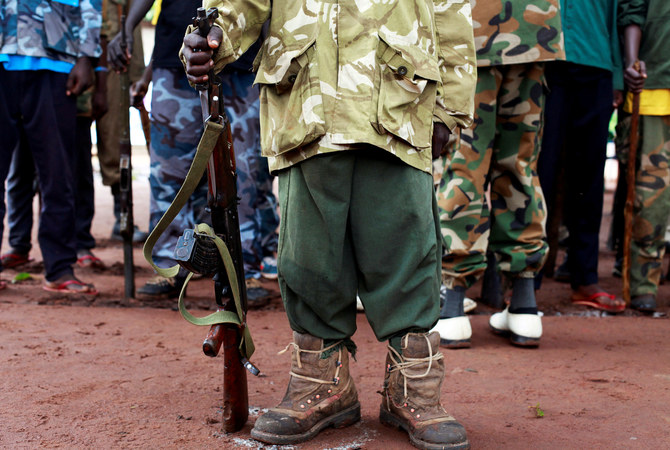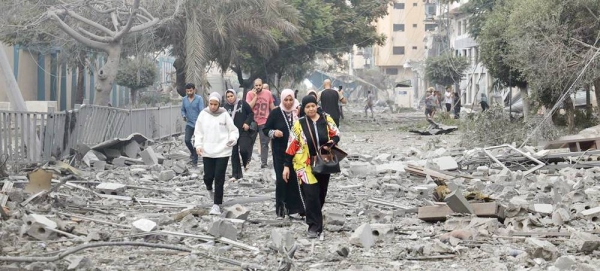
The recruitment and use of child soldiers remains one of the gravest violations and abuses against children. This globally critical issue ought to be confronted and addressed by the international community.
In spite of the existence of an international mechanism to monitor and report violations against children, the recruitment and use of child soldiers has been on the rise. The UN Security Council has identified six grave violations affecting children, one of which is the recruitment or use of children as soldiers. The other violations are: sexual violence against children; abduction of children; attacks against schools or hospitals; killing and maiming of children; and denial of humanitarian access for children.
These violations against children are interconnected and intertwined. In other words, when a growing number of children are being recruited as soldiers in a specific country or area, this means that other violations against children, such as sexual abuse or killings and attacks on children, are likely to be on the rise as well.
It is worth noting that countries that witness internal conflict and war unfortunately become a ripe place for some groups to recruit boys or girls as soldiers. Conflict leads to political and economic instability, causing militias and terrorist groups to increase their activities. These groups exploit weak or failed states, as well as underdeveloped nations, and attempt to recruit more soldiers, including children, in order to gain, expand and consolidate power.
Countries that witness conflict unfortunately become a ripe place for some groups to recruit boys or girls as soldiers.
Dr. Majid Rafizadeh
Unfortunately, children are considered more expendable, less likely to question orders and cheaper to recruit. Child soldiers often undergo harsh training that inflicts long-term mental and physical damage. This will undoubtedly have a negative impact on their families as well. This is why it is critical to help reintegrate child soldiers into society through effective rehabilitation centers and provide for physical and psychological recovery services.
Children are often sent to the front lines as combatants, but they are also forced to take on other responsibilities in the conflict or work in other positions, such as being a spy or messenger. Some girls and boys are also exploited sexually.
Proactive measures ought to be taken to help prevent the recruitment of children as soldiers. These measures include empowering boys and girls through proper education, strengthening protective laws concerning children, addressing families’ and communities’ financial hardships, and creating political and economic stability, as well as brighter prospects for the future. It is also necessary to combat the spread of extremist ideologies and raise awareness about these threats, along with preventing internal disagreements from spiraling out of control and leading to full-fledged conflict in the country.
One of the countries that is witnessing an increase in the recruitment of child soldiers is Syria. The conflict in Syria has been going on for more than 12 years and some parts of the country remain very unstable and insecure. This is particularly true of the southern areas, including the city of Deraa, which was the birthplace of the Syrian uprising and is also considered one of the most strategic places in the country. Deraa is close to the border with Jordan, as well as Syria’s Golan Heights region of Quneitra. There is also a major route from Deraa to the capital Damascus.
It should not come as a surprise that the recruitment of children as soldiers has also been witnessed in Sudan. According to the Darfur Bar Association, cases of child soldiers fighting for both parties in the conflict have been reported. In a statement issued last month, the association underscored that “international humanitarian law and various international treaties and norms prohibit the recruitment of children under the age of 15 into combat.”
Unfortunately, children are considered more expendable, less likely to question orders and cheaper to recruit.
Dr. Majid Rafizadeh
Some groups implement different tactics to even recruit foreign children. They often prey on children and families who are vulnerable for various reasons. Some are kidnapped and coerced, while some families are lured to give up their children to fight in conflicts in exchange for financial incentives. In addition, many of these children come from lower socioeconomic classes and the recruiters exploit their poverty. In other words, militia groups will resort to any tool in order to achieve their goals.
Finally, legislation and policies to prohibit, criminalize and punish those who use children as soldiers should be strengthened. And the international community ought to more proactively enforce the Optional Protocol to the Convention on the Rights of the Child on the Involvement of Children in Armed Conflict. This treaty focuses on the involvement of children in armed conflict and it was adopted by the UN General Assembly in 2000. It came into force in 2002 and has been ratified by 173 nations.
In a nutshell, the recruitment of children as soldiers remains one of the gravest abuses committed against children. The increasing recruitment of children to fight in conflicts not only has serious psychological and physical implications for the children and their families, but also inflicts serious damage on the security and stability of nations and broader regions. Boys and girls must be protected and empowered through education. It is crucial for the international community and human rights organizations to follow up on their promises by taking immediate action to hold to account those responsible for violating international law, abusing human rights and children, and committing war crimes. The abuse of children must stop.
Dr. Majid Rafizadeh is a Harvard-educated Iranian-American political scientist. Twitter: @Dr_Rafizadeh












